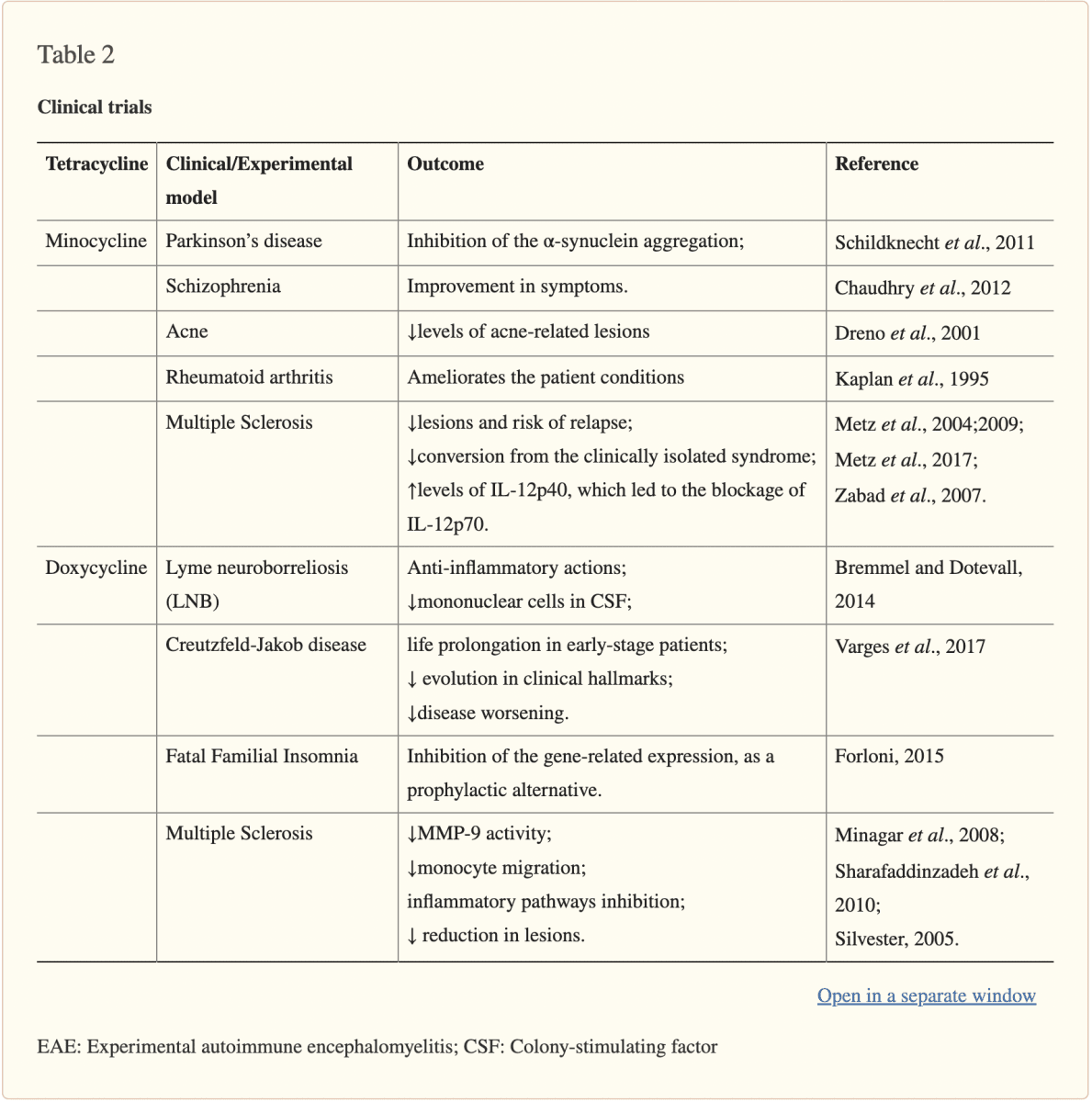
The National MS Society suggests that MS and Lyme Disease share much in common – especially when it comes to symptoms and testing positive through MRI and lumbar punctures. Yet they claim that the big difference between Lyme disease and MS is that MS patients don’t respond to antibiotic therapy, whereas Lyme patients often do if treated early.
The findings from clinical trials show just the opposite, that MS patients often do respond to antibiotic therapy.
From the National MS Society’s website:
“… similarities in symptoms and test results have led some people with MS to seek testing for the presence of antibodies to Borrelia, to determine if their neurologic symptoms are the result of Lyme disease or truly MS. The distinction is important because Lyme disease, especially when treated early, often responds to antibiotic therapy, whereas MS does not.”
Let’s see if the research supports their claim that MS does not respond to antibiotic therapy.
Evidence That Borrelia is One of the Parasites that Cause MS
There were many MS–spirochetes research studies published before World War II, going back as far as 1911 and published in prestigious journals like the Lancet
Visit www.LiveDiseaseFree.com/ms-infections to view the list of these studies.
Pathologist Dr. Alan MacDonald discovered Lyme spirochetes in filarial worms in the central nervous system of every MS patient tested. He also found Lyme spirochetes in the spinal fluid of MS patients and Lyme spirochetes infecting the myelin sheath of brain nerve cells in Alzheimer’s patients.
Alan MacDonald’s Lecture: Multiple Sclerosis is a Parasitosis
Borrelia Endosymbionts in Parasitic Nematode Worm in MS
Dr. Alan MacDonald: Video Clips from “Under our Skin (2008)
If Borrelia is present in the CNS of MS patients and other neurological diseases, it is very possible that these bacteria could infect the nerve cells of MS patients (similarly to Alzheimer’s patients) and this would cause an immune response.
Evidence That MS Patients Respond to Antibiotics for the Treatment of Lyme Disease
I’m not advocating for the use of antibiotics for treating MS. Long term antibiotic use has not cured MS patients and given them their lives back. I am not a fan of using antibiotics for treating Lyme disease or MS. I have worked with many students who tested positive for Lyme, worked with Lyme literate doctors, were prescribed antibiotics for months or years and were still very sick.
But it is interesting that a significant number of MS patients prescribed minocycline and doxycycline (antibiotics that treat Lyme) have responded positively to these antibiotics.
The study, Trial of Minocycline in a Clinically Isolated Syndrome of Multiple Sclerosis was a 2017 randomized, controlled trial that investigated if the antibiotic minocycline could reduce the risk of conversion from a first MS attack (clinically isolated syndrome) to multiple sclerosis. This study was supported by the Multiple Sclerosis Society of Canada.
“This trial showed that the risk of conversion from a clinically isolated syndrome to multiple sclerosis at 6 months was significantly lower with minocycline than with placebo and all MRI outcomes at 6 months favored minocycline over placebo. The differences between the groups were not sustained at 24 months.”[i]
This study showed a significant decrease in the progression of MS especially in the first six months and it’s strange that this was supported by the MS society and yet they state on their website that antibiotic use does not help MS patients.
In four clinical trials, the use of minocycline resulted in a reduction of lesions, less relapses, less inflammation, smaller lesions sizes, minimal side effects and less disease severity in the first 6 months of the study, but not at 24 months.
The following table is from the study Can tetracyclines ensure help in multiple sclerosis immunotherapy?

In one clinical trial studying the effect of doxycycline on MS, researchers also found reduced lesion sizes and the suppression of monocytes where only one patient had a relapse and minor side effects. Also, doxycycline also supported a decrease in inflammation and less lesions, showed by contrast-enhanced MRI.
These results show a good initial response when MS patients are given minocycline or doxycycline against developing the disease after the initial attack. This reduces the likelihood for future MS attacks, which is essential to stopping the progression of multiple sclerosis and avoiding future relapses.
The results of studies confirm the effective role of these two drugs as anti-inflammatory agents in experimentally induced models of neurodegenerative diseases. In clinical studies, satisfactory results have been obtained in Multiple sclerosis (MS)
Tetracyclines have anti-inflammatory effects, because they treat parasites. Minocycline and doxycycline have been used to treat acne and suppress inflammation in various conditions.
MS and Babesia/Malaria
For over 100 years, many researchers believed that MS was caused by a Malaria/Babesia type protist. Review my MS and Malaria/Babesia posts on the topic below:
Part 1 – MS News: Malaria Drug May be a Promising Treatment for PPMS
Part 2 – [MS Research] Multiple Sclerosis and Malarial Parasites
Part 3 – [MS Research] Multiple Sclerosis and Malarial Parasites
The antibiotics doxycycline or minocycline which are used to treat Borrelia, are also used to treat Babesia and Malaria when prescribed in combination with other drugs.
Drug companies would like to repurpose these antibiotics so they can be used as maintenance drugs designed to be taken ongoing for neurological diseases like MS, Alzheimer’s and Parkinson’s disease. They would like to chemically modify tetracycline drugs, so they don’t impact our health promoting microbes but still have an anti-inflammatory effective against the progression of neurological diseases.
They hope that this strategy will reduce the risk of long-term therapy-related adverse effects (particularly gut-related ones) and bacterial resistance toward the tetracycline antibiotic agents, but they state that more research is needed to ensure the benefits and safety of these potential new drugs for neurological disease.
It is painfully obvious that MS patients experience less inflammation, a decrease in lesions and progression of the disease when they take tetracycline antibiotics because they treat parasites. Inflammation occurs when our immune system fights parasites. If the antibiotics are treating some of the parasites that cause MS, our immune system won’t have to work as hard and we will experience less inflammation and symptom improvements. This is common sense!
But if drug companies “chemically modify” these antibiotics and attempt to remove their antimicrobial properties so the new drugs won’t damage our gut flora, the newer more expensive, patented drugs also won’t treat the infections that are causing MS symptoms and thus they won’t maintain their anti-inflammatory benefits.
And of course, this will take years of research and thousands of dollars, and in time they may promote another disease modifying maintenance drug that causes people to suffer with their disease for their lifetime.
When we suffer from chronic disease we are in a state of dysbiosis. We are out of balance and have too many disease-causing microbes and not enough health-promoting microbes in our body. Some of the larger parasites infect us with the smaller parasites like Borrelia and Babesia. If we don’t treat larger parasites first, we will continually be reinfected with the smaller ones.
To recover from disease, we must use a holistic approach and treat multiple parasites strategically. This is the only way to get our health and life back and to feel better than we have for years.
There are real solutions to recover from parasites today!
To restore health, we must focus on treating the cause of inflammation, which are parasites. First, identify the enemy (parasites), then support the body and treat the parasites while following a holistic approach. When parasitic infections are treated effectively, we can overcome inflammation or disease.
If you’re frustrated with the fact that our standard of care STILL doesn’t offer a real solution for treating MS or other diseases, then click on the link below to watch Pam Bartha’s free masterclass training and discover REAL solutions that have allowed Pam and many others to live free from MS.
CLICK Here to watch Pam’s masterclass training
References:
The National MS Society – Lyme Disease and MS
https://www.nejm.org/doi/10.1056/NEJMoa1608889
https://www.ncbi.nlm.nih.gov/pmc/articles/PMC8177043/
https://pubmed.ncbi.nlm.nih.gov/35710076/
https://www.ncbi.nlm.nih.gov/pmc/articles/PMC8177043/#B120
https://www.ncbi.nlm.nih.gov/pmc/articles/PMC4641395/
https://academic.oup.com/cid/article/30/1/237/322583
https://www.treatlyme.net/guide/kills-babesia-a-brief-guide
https://pubmed.ncbi.nlm.nih.gov/34982206/
Blog Featured Image credit: ©photostockeditor via Canva.com

Clinically diagnosed with multiple sclerosis at the age of 28, Pam chose an alternative approach to recovery. Now decades later and still symptom free, she coaches others on how to treat the root cause of chronic disease, using a holistic approach. She can teach you how, too.
Pam is the author of Become a Wellness Champion and founder of Live Disease Free. She is a wellness expert, coach and speaker.
The Live Disease Free Academy has helped hundreds of Wellness Champions in over 15 countries take charge of their health and experience profound improvements in their life.

